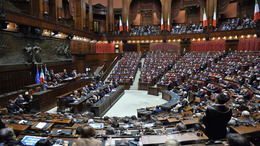Political leaders today are increasingly aware that being at the cutting edge of technological innovation will prove crucial for citizens to retain their sovereignty. Europe has struggled to come to terms with the dominance of American tech giants in particular, amid recurring scandals from tax avoidance to abuse of personal data on social media.
French President Emmanuel Macron recently affirmed that artificial intelligence, a topic traditionally receiving more attention from science fiction writers than heads of state, was also an area which would prove critical for Europe. In an interview with Wired, Macron said his "goal is to recreate a European sovereignty in A.I." and argued that "if you want to manage your own choice of society, your choice of civilization, you have to be able to be an acting part of this A.I. revolution". While artificial super-intelligence poses threats, frontrunner nations in the field will earn themselves a decisive technological edge, with their leadership in A.I. enabling further innovation.
The European Union has certainly not been a passive observer in this area, but has scored clear wins in recent years, providing some justification for the bloc's stated intention to help its citizens to "shape globalization." For years, the Commission has pressured tech giants to pay their fair share of tax and reduce monopolistic practices, including inflicting record multi-billion euro fines. Even though the European Parliament made it easy for Mark Zuckerberg to avoid answering tough questions in his recent testimony in Brussels, the bloc's relentless advocacy for data privacy may still have had an impact on Facebook's CEO. Addressing hearings at the U.S. Senate earlier on, Zuckerberg said that his company would make EU data protection and privacy rules their global standard.
![[Translate to English:] Ein Auge mit einem eingepflanzten Computerchip](/fileadmin/files/_processed_/f/6/csm_1058386674future-175620_66d3cc2cac.jpg)



![[Translate to English:] Andrej Babis](/fileadmin/files/_processed_/2/b/csm_399707067EA7A8339_da8d3d91d2.jpg)


